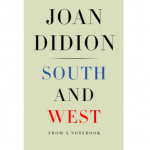

that for some years the South and particularly the Gulf Coast had been for America what people were still saying California was, and what California seemed to me not to be: the future. “There was no reportorial imperative to any of the places I went at the time I went: nothing ‘happened’ anywhere I was, no celebrated murders, trials, integration orders, confrontations, not even any celebrated acts of God,’’ she offers. It’s clear, even in this slender volume, that Didion’s central preoccupations never disappear, regardless of her inimitable portraits of the scenes along the road. She eats “good gumbo’’ in Greenville, “glad to be in a place with good food, glad to be, I suppose, so very close to the place where the National and Delta flights left for California.”

She looks for Faulkner’s grave in Oxford but finds instead a black kid selling pot to white college students from the open door of his “parked two-tone salmon Buick.’’ The past remains past. She visits landed gentry, suspicious of Southerners like Willie Morris, who had gone East to seek literary fortune, or even those, like Walker Percy, who had stayed but reserved private views on race and other local customs. The death had seemed serious but casual, as if it had taken place in a pre-Columbian city where death was expected, and did not in the long run count for much.” “‘Dead,’ pronounced an old woman who stood with me on the sidewalk a few inches from where the car had veered into a tree. Charles Avenue I saw a woman die, fall forward over the wheel of her car,’’ she writes, of a visit to New Orleans. The road trip through Louisiana, Mississippi and Alabama skirts the easy caricatures of race and rapacity of well-meaning journalists of the time, to capture moments that might have taken place anywhere, but are nevertheless locked in Faulknerian geography.

In “South and West: From a Notebook,” they exemplify Didion’s signature brand of reportorial haiku - her pitiless camera eye, razor-sharp wit and telling techniques of self-deprecation that only bring the reader - at least this reader - further along for the ride.


 0 kommentar(er)
0 kommentar(er)
